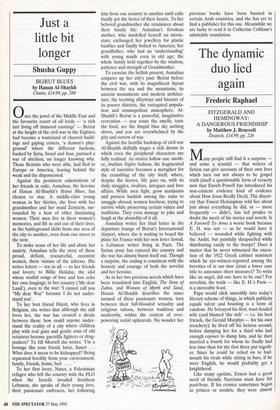Just a little bit longer
Shusha Guppy
BEIRUT BLUES by Hanan Al-Shaykh Chatto, £14.99, pp. 280 once the jewel of the Middle East and the favourite resort of oil lords — 'a rich tart living off immoral earnings' — Beirut at the height of the civil war in the Eighties had become a wasteland of charred build- ings and gaping craters, 'a demon's play- ground' where the different factions, backed by Syria, Israel and Iran, pursued a war of attrition, no longer knowing why. Those Beirutis who were able, had fled to Europe or America, leaving behind the weak and the dispossessed.
Against the persistent exhortations of her friends in exile, Asmahan, the heroine of Hanan AI-Shaykh's Beirut Blues, has chosen to stay. A middle-class young woman in her thirties, she lives with her grandmother and her maid Zemzem, sur- rounded by a host of other fascinating women. Their men live in these women's memories, and flit in and out of their lives, as the battleground shifts from one area of the city to another, even from one street to the next.
To make sense of her life and abate her anxiety, Asmahan tells the story of these proud, defiant, resourceful, eccentric women, these victims of the inferno. She writes letters — ten in all — to her friends and lovers; to Billie Holiday, the idol whose wistful songs of love and loss echo her own longings; to her country (`My dear Land'), even to the war: 'I cannot call you "My dear War" because I do not under- stand you'.
To her best friend Hayat, who lives in Belgium, she writes that although she still loves her, the war has created a divide between them: how could anyone under- stand the reality of a city where children play with real guns and gentle sons of old retainers become guerrilla fighters or drug- pushers? To Jill Morrell she writes: 'I'm a hostage like your friend, lover, fiancé . . . What does it mean to be kidnapped? Being separated forcibly from your environment, family, friends, home, bed . . . . '
To her first lover, Naser, a Palestinian refugee who left the country with the PLO when the Israelis invaded Southern Lebanon, she speaks of their young love, their passionate embraces, her following him from one country to another until exile finally got the better of their hearts. To her beloved grandmother she reminisces about their family life: Asmahan's frivolous mother, who modelled herself on movie- stars, exchanged her jewellery for plastic baubles and finally bolted to America; her grandfather, who had an 'understanding' with young maids even in old age; the whole family held together by the wisdom, patience and strength of Grandmother.
To exorcise the hellish present, Asmahan conjures up her city's past: Beirut before the civil war, with its magnificent layout between the sea and the mountains, its ancient monuments and modern architec- ture, the teeming alleyways and bazaars of its poorer districts, the variegated popula- tion and cosmopolitan atmosphere. Al- Shaykh's Beirut is a powerful, imaginative recreation — you sense the smells, taste the food, see the limpid blue sky arching above, and you are overwhelmed by the pity and sorrow of war.
Against the horrific backdrop of civil war Al-Shaykh skilfully stages a rich drama in which even the peripheral characters are fully realised. As stories follow one anoth- er, Arabian Nights fashion, the fragmented style of narrative becomes a metaphor for the crumbling of the city itself, where, despite the horror, life goes on, with its daily struggles, rivalries, intrigues and love affairs. While men fight, grow marijuana and process hashish among the ruins to smuggle abroad, women forebear, trying to survive while preserving certain values and traditions. They even manage to joke and laugh at the absurdity of it all.
Asmahan writes her final letter in the departure lounge of Beirut's International Airport, where she is waiting to board the plane for France with her new lover Jawad, a Lebanese writer living in Paris. The Syrian army has entered the country and the war has almost burnt itself out. Though a surprise, the ending is consistent with the honesty and courage of both the novelist and her heroine.
As in her two previous novels which have been translated into English, The Story of Zahra, and Women of Myrrh and Sand, Hanan Al-Shaykh describes the inner turmoil of these passionate women, torn between their full-blooded sexuality and religious taboos, between tradition and modernity, within the context of over- powering social upheavals. No wonder her previous books have been banned in certain Arab countries, and she has yet to find a publisher for this one. Meanwhile we are lucky to read it in Catherine Cobham's admirable translation.


































































 Previous page
Previous page